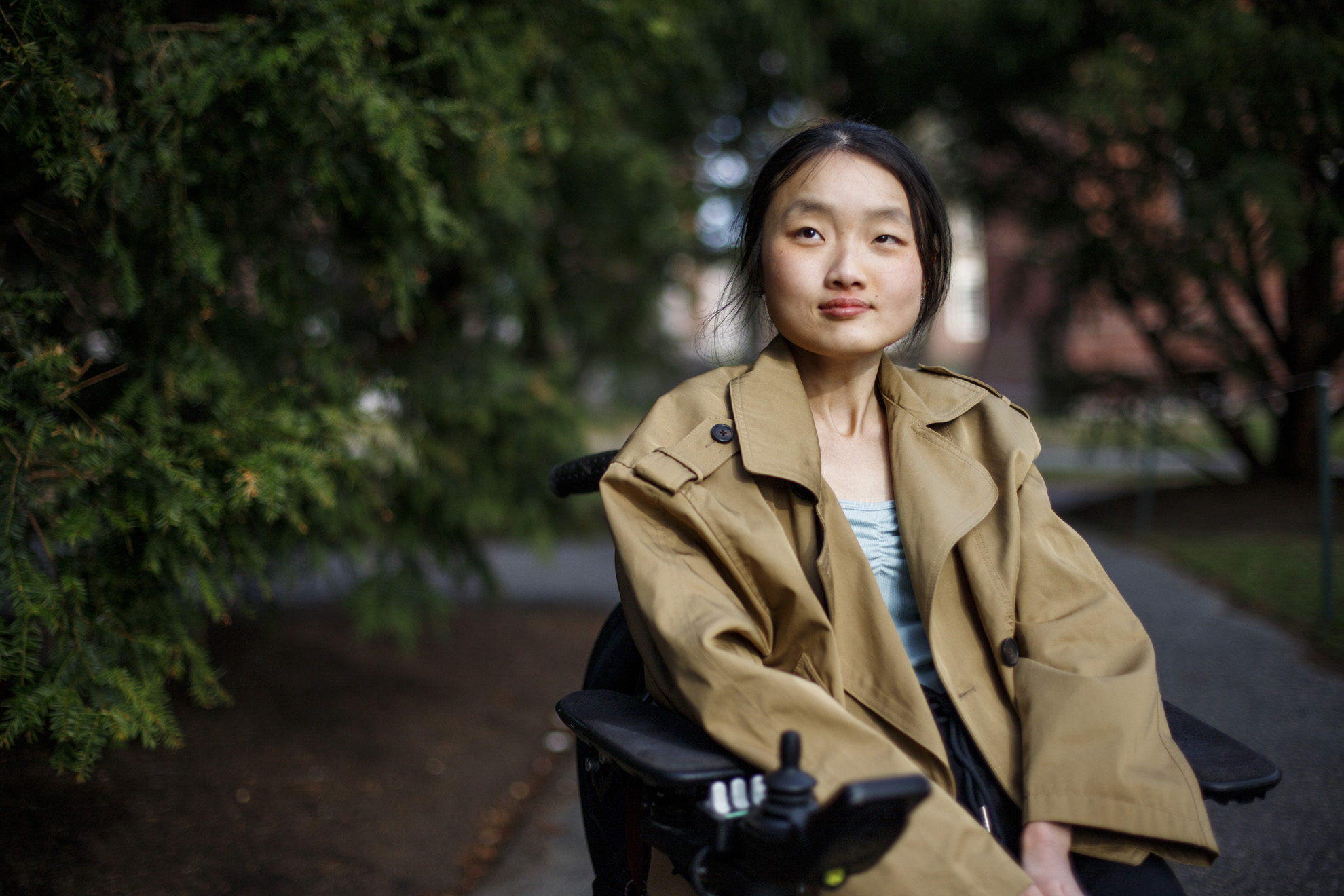
Melissa Shang.
Photo by Grace DuVal
Identifying barriers faced by people with disabilities
Melissa Shang conducts ambitious survey for senior thesis, filling ‘major gap’ in scholarship
Part of the Commencement 2025 series
A collection of features and profiles covering Harvard University’s 374th Commencement.
Melissa Shang had planned to become a disability rights attorney and had set her sights on studying sociology on a prelaw track. Once at Harvard, she quickly found a new possibility.
“My whole reason for wanting to go into disability rights law was to be able to support people with disabilities,” said Shang, who has a degenerative nerve disorder called Charcot-Marie-Tooth disease. “I realized I could do that within the field of psychology.”
Switching her concentration allowed the Waltham, Massachusetts, native to take a deep look at the barriers faced by more than 70 million Americans who report one or more disability. Her senior thesis, which draws upon a deep well of original survey data, tested the hypothesis that experiencing what social scientists call “minority stressors” is associated with increased risk of suicidal thoughts and attempts for people with disabilities.
Shang argued that the link between minority stressors and suicidal behavior was brought on by “greater perceived burdensomeness and thwarted belongingness.” She also set out to prove that greater “positive disability identity and community engagement” had the power to weaken the effect.
According to thesis adviser Mina Cikara, the Fredric Wertham Professor of Law and Psychiatry in Society, Shang identified a “major gap” in the field’s research and literature. “It’s incredibly important work,” Cikara said.
Upon landing at Harvard, Shang immediately set about forging her own campus community. First up was co-launching the Harvard University Disability Justice Club. The officially recognized student group, initiated during Shang’s first semester, has since grown to 140 active members.
“I always thought advocacy work to be a bit of a lonely experience, but being able to have this community has been really powerful,” said Shang.
“I always thought advocacy work to be a bit of a lonely experience, but being able to have this community has been really powerful.”
Melissa Shang
The Leverett House resident subsequently fell in love with the Harvard Noteables, a student-run, non-audition Broadway show choir, after attending a single rehearsal her first year.
“Then I went to more rehearsals, and I realized that it was an accepting space and so different from the environment that I was exposed to back at my high school,” Shang said. “The sense of inclusion, accessibility, and community that this club brought — that allowed me to rekindle my passion for singing — has been really incredible.”
In the classroom, Shang’s early years were spent seeking answers to important questions within the field of disability studies. “I started learning more about what the mental health system was for people with disabilities and how inaccessible it could be,” Shang explained. “It can be extraordinarily difficult to find providers who are disability-informed, and many people are denied mental health services because of their disability needs.”
She also learned how little attention the problem has received from academics. “When I looked into the research that’s been done about systemic barriers for people with disabilities, I found very little to no research about it,” she recalled.
As a sophomore, Shang enrolled in Cikara’s research methods course. It proved to be a pivotal decision. The course introduced Shang to Cikara’s work, which later helped Shang identify a set of minority stressors to investigate in her thesis, including discrimination, internalized stigma, and identity concealment.
Cikara initially counseled Shang against her “incredibly grand plan” of reaching out to various disability organizations for help distributing surveys to those they serve. But Shang could not be dissuaded. In the end, the strategy enabled her to survey hundreds of Americans with disabilities about their mental health experiences.
“This is a testament to her character,” Cikara observed. “She just did it. She pounded the pavement over and over again. She collected over 200 responses from people all over the country, many of whom have a wide variety of disabilities. That was no small feat.”
Ultimately, Shang’s findings only somewhat supported her theory that stigma experienced by people with disabilities relates to suicidal behavior. Shang noted that “internalized stigma” was one factor that was found to be associated with suicidal behavior. But the project still marks an essential contribution, Cikara said.
“What she’s done is seed the field with this incredible pilot dataset which she could spend years building,” she said.
Shang’s next chapter brings her to a clinical psychology doctorate program at Oregon State University. She plans to continue researching people with disabilities, their encounters within the mental health system, and the many barriers they face.
“Because people with disabilities are so valuable in society,” Shang said, “it’s important to keep conducting research that gauges their experiences and mental health — and to make an active effort to better support them and improve the way they’re treated.”




